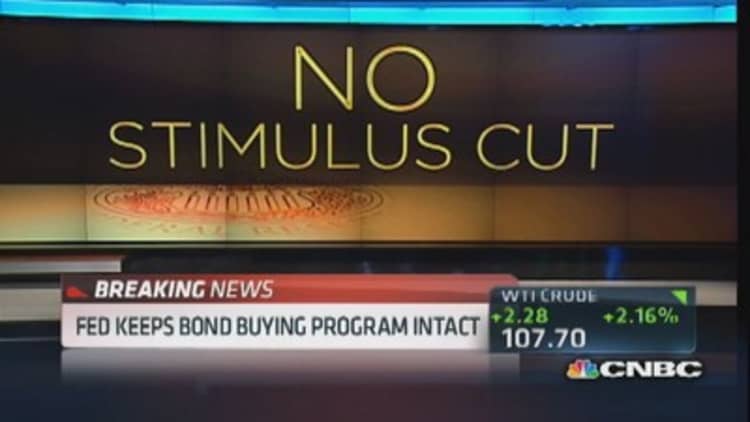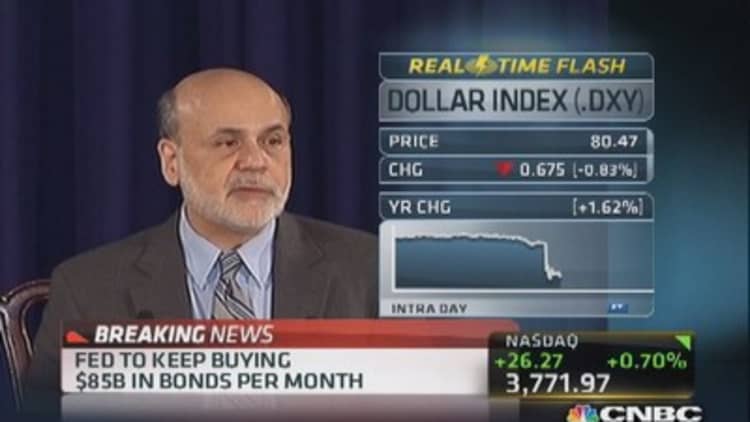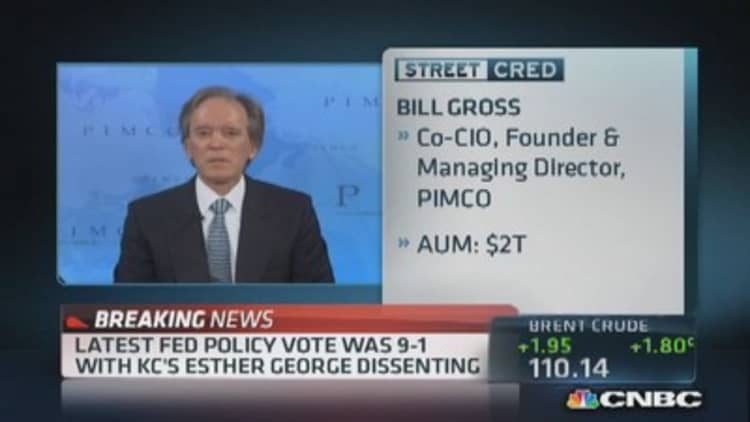An economy still stumbling toward recovery was not enough to sway the Federal Reserve, which defied market expectations Wednesday and said it will not begin pulling back on its monthly asset-purchasing program.
Stocks on the Dow industrials and S&P 500 averages surged to record highs on the news and bond yields moved sharply lower, with the benchmark 10-year note most recently at 2.76 percent.
"This is incredibly wimpy," David Kelly, chief global strategist at JPMorgan Funds, told CNBC.
The Fed said it was unsatisfied with the pace of economic growth and felt the timing was not right to make a change in quantitative easing.

Fed Chairman Ben Bernanke said that while the economy is growing, fiscal tightening in Washington in the form of sequestration spending cuts remains a significant obstacle.
"The downside risks to growth have diminished over the past year," Bernanke said at a news conference. "However the tightening of financial conditions in recent months, if sustained, could slow the pace of improvement in the economy and labor market."
He stressed that any Fed moves toward the tapering will be dependent on economic data improvements.
After riling markets earlier in the summer with talk about reducing asset prices, Bernanke was less certain when talking to reporters.
He said the Fed would taper "at some point, possibly later this year," a contrast to his statement in June that a reduction would almost certainly happen later this year, with a wrap-up by mid-2014.
Traders cheered the developments, despite their somewhat dour implications for the state of the economy, with the belief that more QE would keep fueling the stock rally.
"The idea that the economy is still too weak to taper and market goes up has its limits," Leon Cooperman, manager of the Omega Advisors hedge fund, told CNBC. "If we keep going we are taking away from future returns."
Bernanke further insisted that market demands would not dictate Fed action.
Responding to a question of whether the Fed was confusing the markets, he defended his decision to raise the tapering issue.
"Failing to communicate that information would have risked creating a large divergence between market expectations, public expectations and what the committee intentions were, and that could have led to much more serious problems down the road," he said.
The Fed is buying $85 billion a month in Treasurys and mortgage-backed securities, with the greater weighting of $45 billion toward the former.
"Taking into account the extent of federal fiscal retrenchment, the Committee sees the improvement in economic activity and labor market conditions since it began its asset purchase program a year ago as consistent with growing underlying strength in the broader economy," the statement said.
"However, the Committee decided to await more evidence that progress will be sustained before adjusting the pace of its purchases."
(Read more: Taper: What Wall Street's favorite buzzword means)
The statement served both as a notice that the Fed remains in the easing game, and that it is unmoved by a recovery that has seen auto and home sales surge and employment show slow but steady growth.
Only Kansas City Fed President Esther George dissented from the vote.
"Clearly, the doves—focused predominantly on labor market slack and a fragile housing recovery—prevailed at today's meeting," Joe LaVorgna, chief U.S. economist at Deutsche Bank, said in a note to clients.

The Fed officially downgraded its outlook for the economy.
Officials said gross domestic product growth will be in the 2 percent to 2.3 percent range this year, down from 2.3 percent to 2.6 percent forecast earlier this year. It also cut the 2014 forecast to 2.9 percent to 3.1 percent from 3.0 percent to 3.5 percent.
"Surprising news today but the Fed clearly is concerned about lower labor participation rates and the real estate sector," said Michael Yoshikami, CEO of Destination Wealth Management. "Looks like they are determined to avoid premature celebrations that all is well. Bernanke is drawing from his academic background and lessons from the Great Depression."
(Read more: Full text: Federal Reserve's FOMC statement)
Markets had been hotly anticipating the Fed's direction ever since the Open Markets Committee began dropping hints about the gradual decrease of monthly asset purchases.
Economists expected the Fed to reduce by about $15 billion a month, according to a recent CNBC poll. Bank of America Merrill Lynch was an outlier—justifiably, it turned out—forecasting the greater likelihood that the central bank will wait until later in the year before reducing its purchases, a process the market has come to call "tapering."
"The Fed understands, as the market seems not to, that the current 'recovery' could not survive without continuation of massive monetary stimulus," Peter Schiff, CEO of Euro Pacific Capital, said in a statement.
The hope is that the money makes its way back into the economy through the purchase of risk assets like stocks and creates a wealth effect that leads to growth. Its success, though, has been varied, with a huge boost to the stock market but only modest gains in the broader economy.
(Read more: How today's Fed statement compares to previous one)

With the market anticipating a tapering, interest rates had been on a steady climb higher. Fixed income traders interpreted Wednesday's news as bearish for rates.
Stock market prices, though, have continued to rise even in the face of a lower level of liquidity support.
Market participants, instead, mainly bristled at the prospects of the Fed raising its main policy rate, which has held near zero since the beginning of quantitative easing in late 2008.
The Fed has insisted it will not begin raising the funds rate before the unemployment rate falls to 6.5 percent and inflation rises to 2.5 percent. Unemployment is at 7.3 percent and inflation remains low at 1.5 percent.
Speculation has run rampant about the future leadership of the Fed, with Bernanke's term expiring in January.
Former White House economic adviser Larry Summers recently withdrew his name from consideration, leading many market observers to assume San Francisco Fed President Janet Yellen was next in line.
Asked to comment on his own future, Bernanke said, "Today I want to focus on monetary policy and I prefer not to comment on my own plans."
_ By CNBC's Jeff Cox. Follow him @JeffCoxCNBCcom on Twitter. CNBC's Matt Twomey contributed to this report.


